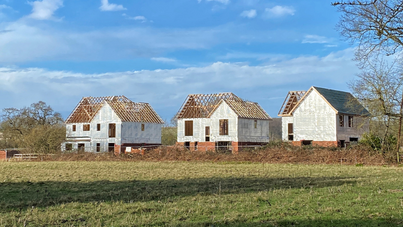Author
The recent High Court case of Davies-Gilbert v Goacher [2022] EWHC 969 (Ch) sets out the general principles to be followed when determining whether the refusal of consent by a landowner whose land benefits from a restrictive covenant is unreasonable.
The Facts
The claimant owned a significant area of land in East Sussex (the “Estate”), part (but not all) of which benefitted from a restrictive covenant (“Covenant”). The defendants’ land was burdened by the Covenant.
The Covenant provided as follows:
”… NOT to erect upon any part of the property hereby conveyed any other messuage erection building or wall whatsoever without such previous written licence as aforesaid such licence not to be unreasonably withheld” (emphasis added).
The defendants wanted to construct two detached dwellings on their land. However, the claimant refused to consent to this for two reasons, namely that if the development were to proceed:
- it would have a detrimental impact on the amenity value of the Estate; and
- it could threaten the future use and commercial value of the neighbouring land.
A number of considerations contributed to the claimant’s reasons including the:-
- impact of the proposal on his neighbouring land;
- impact on future anticipated use and value of that land;
- impact on the amenity value of the Estate in the locality as a whole; and
- effect on boundary treatment and maintenance.
Despite the claimant’s refusal to consent to the proposal, the defendants proceeded to commence works in the belief that the claimant’s refusal was unreasonable.
The Issue
The main issue in the case for the Court to decide was whether the claimant’s refusal to consent was indeed unreasonable. In arguing that it was not, the defendants essentially claimed (amongst other matters) that the claimant’s decision-making process was flawed for taking into account irrelevant considerations.
Reasonableness – General Principles
In reaching a decision, the Court helpfully distilled a number of general legal principles which can be applied in any given case where the reasonableness of consent under a restrictive covenant is in question.
In summary:-
- There is no authority to support the proposition that a refusal will be automatically unreasonable if is based on a concern which could be neutralised by imposing a condition.
- Where a refusal is based on aesthetic grounds, it is insufficient for the proposal to simply not be to one’s taste.
- The primary finding of fact the Court must make in a case like this is the actual reason or reasons (at the time of the refusal) which resulted in the covenantee refusing consent.
- There was no magic in use of the word “reasons” in case law. However, reasons and considerations were not the same thing. The latter category is potentially a broader category than the former.
- The process of reaching a decision and the reason itself must be reasonable applying the two-limb test comprised in the “Wednesbury principle”.
- It will be unreasonable for a covenantee to refuse consent for the purpose of achieving a collateral or uncovenanted advantage.
- As part of a reasonable decision-making process, a decision maker must exclude extraneous/irrelevant considerations whilst taking into account relevant considerations. However, not all decisions will be automatically rendered unreasonable as a result of an irrelevant consideration being taken into account. That will depend on whether the consideration contributed to/influenced the reason – as considerations can be given a “zero-weighting”.
- Where there is a refusal for a mixture of good and bad reasons, the refusal would still be reasonable if there was at least one “free-standing” good reason and the decision would have been the same absent the bad reasons.
Reasonableness – the Claimant’s refusal
Applying those principles to the claimant’s refusal, the Court held:
- The first reason for refusal of consent was not reasonable.
Amongst other matters, it took into account the impact of the proposal on the Estate (which included non-benefitted land) – an irrelevant consideration. Covenantees are not entitled to take account of matters that did not affect the benefitted land. Applying the above legal principles, as irrelevant considerations contributed to the first reason, that reason was unreasonable (or a “bad” decision).
- The second reason was, however, reasonable.
That reason considered the effect of the scheme on the future use and commercial value of neighbouring land (which did benefit from the Covenant). That was a “free standing” reason not influenced by any irrelevant considerations. The Court concluded the claimant had followed a reasonable decision-making process and reached a reasonable conclusion (i.e. a “good” decision).
Overall, therefore, the claimant’s refusal of consent was reasonable. The claimant was awarded a declaration to that effect and injunctive relief (or such undertaking in lieu).
Comment
This case serves not only as a useful summary of the existing legal principles applicable to qualified covenants and dealing with reasonable decision-making – it also helpfully clarifies the approach to be taken with the concept of “irrelevant considerations” in the field of restrictive covenants.
For anyone advising in connection with applications for consent under covenants, this case will emphasise the importance of scrutinising not only the principle headline reasons for a refusal, but also the underlying considerations which may have influenced those. If challenged, those considerations will be of utmost importance for determining whether a decision is reasonable. It is therefore better to grapple with those at the outset.
A refusal will still be reasonable provided there is one “good” free-standing reason. From a practical perspective, the case therefore also highlights the benefit of giving several reasons for refusal.
The Judge in this case particularly welcomed the opportunity to undertake a site visit which the Judge comments had inevitably influenced the Court’s findings. Those advising in this area might also seek to introduce the same where appropriate to give greater context to the subject matter.
The principles in the case are likely to be relevant whether dealing with freehold or leasehold property.
Print article

